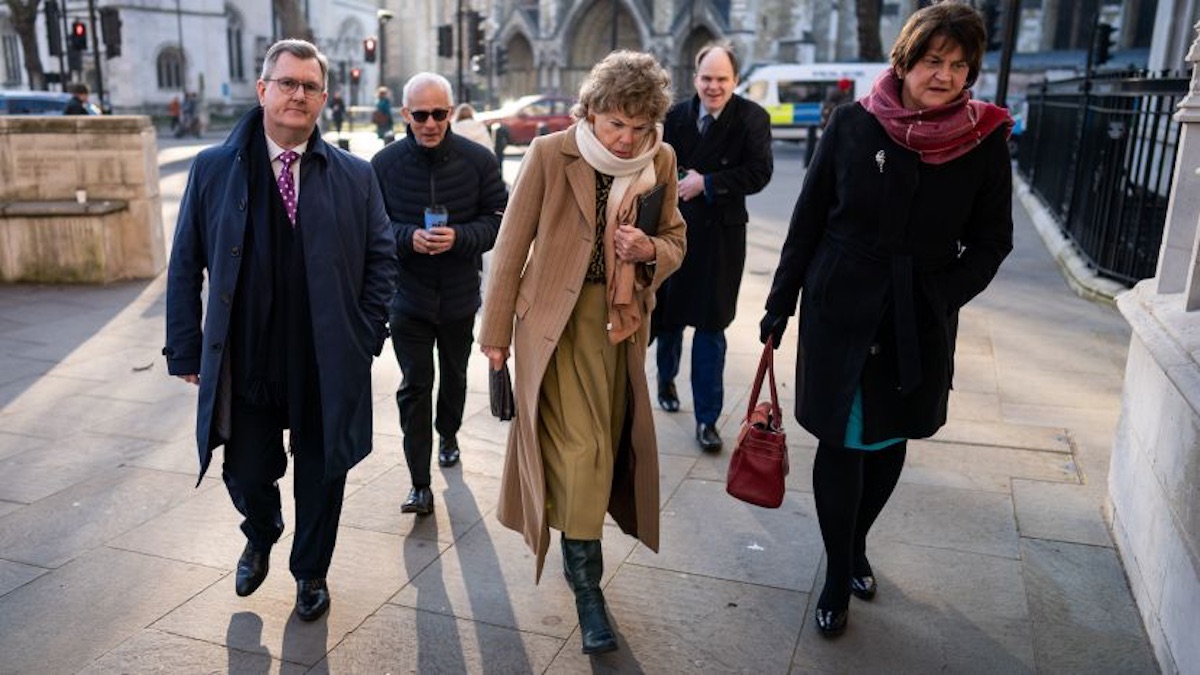
Unionists have failed in their legal attempts to force a renegotiation of the Brexit Withdrawal Agreement after the Supreme Court in London unanimously dismissed a challenge to its new trading procedures.
The legality of Brexit’s Protocol on Ireland was challenged at Britain’s highest court by a group of unionists and extremist supporters of Brexit.
It came after a Belfast High Court judge dismissed a judicial review challenge against the lawfulness of the new arrangements on all grounds in 2021. His judgment was upheld by the Court of Appeal last year.
Sinn Féin vice president Michelle O’Neill welcomed Wednesday’s ruling by the Supreme Court and said it “rejects arguments that the Protocol is incompatible with the Good Friday Agreement”.
“The Protocol is lawful, but also necessary to limit the damage done by Brexit,” she said. “No credible alternative exists, we need to make it work better for everyone.”
In a change of tactics, unionists declared a moral victory by insisting the legal challenge had proven that Article 6 of the Acts of Union had been amended by Brexit legislation. However, the Supreme Court expressed no opinion on that matter, as the appellants had not challenged the ruling of the Appeal Court on that issue.
The court also upheld the Appeal Court’s ruling that the constitutional status of the North had not been changed, and that the Westminster parliament retained the right to override the Stormont Assembly on all matters.
DUP leader Jeffrey Donaldson insisted the judgment had “brought great clarity to the reality that the Protocol has altered Northern Ireland’s position in the United Kingdom by virtue of subjugating Article Six of the Act of Union, which gives us the right to trade freely within the United Kingdom.
“It also changes a key principle at the heart of the Good Friday or Belfast agreement, which is the need for cross-community consent on matters of import to the people of Northern Ireland and the court confirmed that that has been changed without the support or consent of the people of Northern Ireland,” he declared.
“These are the things that need to be addressed in UK law to restore our place within the United Kingdom.”
Donaldson insisted that the Brexit deal once party by his party “represents an existential threat to the union”. But with major concessions by the EU to satisfy the DUP’s shopping list of demands, there is renewed pressure on the party to end their year-long boycott of the power-sharing institutions at Stormont.
The latest bout of hardline rhetoric comes amid new attempts by senior DUP figures to challenge fundamental areas of EU law. Their intransigence points to a party that has no interest in returning to a legislature where, following election losses in May, unionism is no longer dominant.
Meanwhile, a former unionist leader who helped negotiate the Good Friday Agreement has suggested that the Six Counties could come under a form of joint authority if the DUP maintains it boycott.
Former UUP leader Reg Empey, now a ‘Lord’ in the London parliament, said changes could come if predictions of a Sinn Féin-led government in Dublin and a Labour administration in London are borne out.
He described as “disastrous” the past two decades years of DUP-led unionism, accusing the party of “squandering” the unionist majority.
“The risk is that we move gradually but inexorably towards a benign form of joint authority. It won’t be called that of course, but Northern Ireland’s place in the UK will be further eroded.”
Mr Empey said the “particular form of Brexit chosen” had directly led to “this mess”.
“Those who advocated this form of Brexit charged into the campaign with gusto but failed to do their homework. It is noteworthy that not one of them has taken any responsibility.”
He said the DUP had been ‘hoisted by their own petard’.
“Unionism has been painted into a corner,” he said.
“Those who collapsed Stormont last year... are the same people who, on October 2, 2019, signed up to Boris Johnson’s plan for a border in the Irish Sea, describing it as a ‘serious and sensible way forward’.”
He also warned of the possibility of majority rule.
“Who is the majority? Not unionists, who represent 41% of the electorate. The majority is a combination of Sinn Féin, SDLP and Alliance, the same trio that called for the rigorous implementation of the protocol,” he said.
“Without the [Good Friday] agreement, unionism will again be at the mercy of backstairs deals between London and Dublin.”
![[Irish Republican News]](https://republican-news.org/graphics/title_gifs/rn.gif)
![[Irish Republican News]](https://republican-news.org/graphics/title_gifs/harp.gif)

